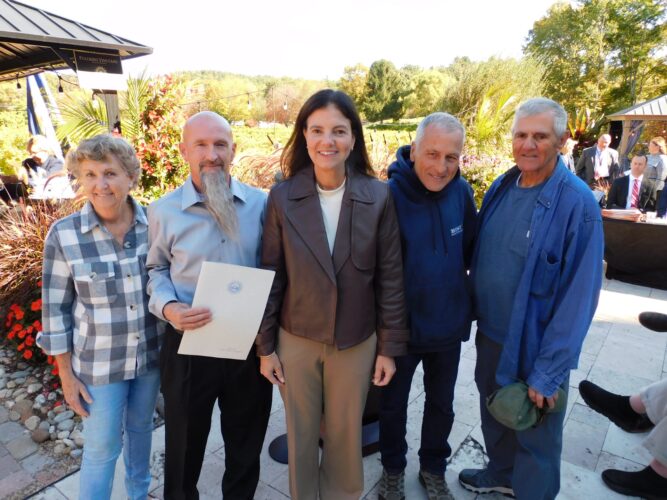Series focuses on economic issues facing the region
The economic climate of New Hampshire and the Souhegan Valley is changing and creating challenges to continued growth.
A number of factors are affecting these changes, such as demographics, the business climate and the rural/suburban nature of the area and state.
A speakers series will examine five of the factors affecting or prohibiting the potential economic development of the Souhegan Valley and New Hampshire as a whole. The Souhegan Valley Chamber of Commerce and Nashua Regional Planning Commission will host the series, bringing a panel together to discuss the factors. The purpose is to educate, spark discussion and broaden understanding of the issues among residents.
The series will be held from 6:30-8 p.m. on the second Thursday of the month for five consecutive months. The final workshops is:
? "Tourism, Arts & Culture," Jan. 12 (snow date Jan. 19), Brookline Town Hall: "The Creative Economy," attracting visitors, the nonprofit world and more.
? The first workshop was "Regional Transportation" on Sept. 8 at Milford Town Hall Auditorium. Would a regional transportation system make sense for the Souhegan Valley? Guest speaker was New Hampshire Department of Transportation Commissioner Victoria Sheehan.
? The second workshop was "Workforce Development & Population Health" on Oct. 13 at Souhegan High School. Local businesses are facing a crisis in the lack of a plentiful, skilled workforce. Although the unemployment rate is low, businesses can’t find the workers they need to grow and meet demand. The discussion concerned how our education system, demographics and health of our residents affect this issue.
? The third workshop was "Infrastructure" on Nov. 10 at Pine Hill Waldorf School in Wilton. How does the physical (roads, bridges, water and sewer) affect local communities’ potential for growth? What about the digital (broadband and cellphone coverage)? Maintaining infrastructure is one of the topmost challenges and expense facing local towns.
? The fourth workship was "Energy" on Dec. 8 at the Hollis Social Library. New Hampshire is one of the most expensive states for energy for residential, commercial and industrial customers. The high cost of energy directly affects the manufacturing sector, the No. 1 provider of jobs in the state. The discussion looked at how energy costs affect our potential for growth.
All workshops are free and open to the public. They are sponsored by The Cabinet, HPM Insurance and Santander Bank.
Series focuses on economic issues facing the region
The economic climate of New Hampshire and the Souhegan Valley is changing and creating challenges to continued growth.
A number of factors are affecting these changes, such as demographics, the business climate and the rural/suburban nature of the area and state.
A speakers series will examine five of the factors affecting or prohibiting the potential economic development of the Souhegan Valley and New Hampshire as a whole. The Souhegan Valley Chamber of Commerce and Nashua Regional Planning Commission will host the series, bringing a panel together to discuss the factors. The purpose is to educate, spark discussion and broaden understanding of the issues among residents.
The series will be held from 6:30-8 p.m. on the second Thursday of the month for five consecutive months. The final workshops is:
? "Tourism, Arts & Culture," Jan. 12 (snow date Jan. 19), Brookline Town Hall: "The Creative Economy," attracting visitors, the nonprofit world and more.
? The first workshop was "Regional Transportation" on Sept. 8 at Milford Town Hall Auditorium. Would a regional transportation system make sense for the Souhegan Valley? Guest speaker was New Hampshire Department of Transportation Commissioner Victoria Sheehan.
? The second workshop was "Workforce Development & Population Health" on Oct. 13 at Souhegan High School. Local businesses are facing a crisis in the lack of a plentiful, skilled workforce. Although the unemployment rate is low, businesses can’t find the workers they need to grow and meet demand. The discussion concerned how our education system, demographics and health of our residents affect this issue.
? The third workshop was "Infrastructure" on Nov. 10 at Pine Hill Waldorf School in Wilton. How does the physical (roads, bridges, water and sewer) affect local communities’ potential for growth? What about the digital (broadband and cellphone coverage)? Maintaining infrastructure is one of the topmost challenges and expense facing local towns.
? The fourth workship was "Energy" on Dec. 8 at the Hollis Social Library. New Hampshire is one of the most expensive states for energy for residential, commercial and industrial customers. The high cost of energy directly affects the manufacturing sector, the No. 1 provider of jobs in the state. The discussion looked at how energy costs affect our potential for growth.
All workshops are free and open to the public. They are sponsored by The Cabinet, HPM Insurance and Santander Bank.





